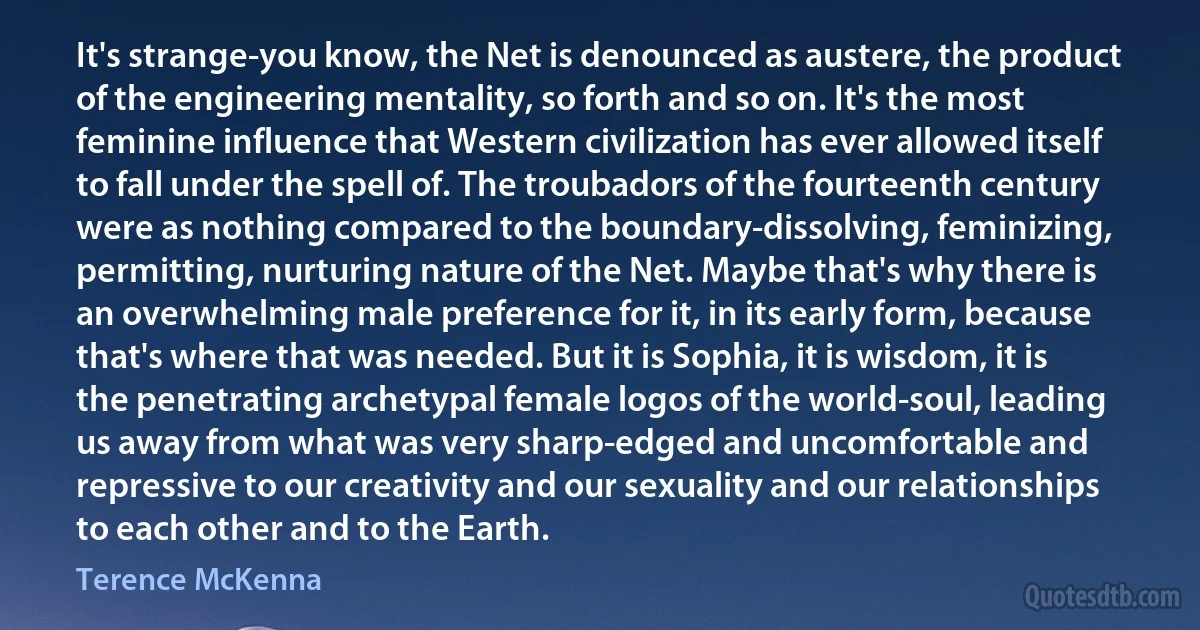
It's strange-you know, the Net is denounced as austere, the product of the engineering mentality, so forth and so on. It's the most feminine influence that Western civilization has ever allowed itself to fall under the spell of. The troubadors of the fourteenth century were as nothing compared to the boundary-dissolving, feminizing, permitting, nurturing nature of the Net. Maybe that's why there is an overwhelming male preference for it, in its early form, because that's where that was needed. But it is Sophia, it is wisdom, it is the penetrating archetypal female logos of the world-soul, leading us away from what was very sharp-edged and uncomfortable and repressive to our creativity and our sexuality and our relationships to each other and to the Earth.
Terence McKennaRelated topics
century early earth engineering fall female form forth fourteenth logos male mentality nature net nothing permitting sexuality spell under western wisdom creativity sophiaRelated quotes
You know my tendency is always to imagine things in my head and to work from this idea. I am going to explain my theory of blue, yellow and red, which will probably seem as 'Spanish' to you as my face.
Blue is the male principle, astringent and spiritual. Yellow is the female principle, gentle, gay and spiritual. Red is matter, brutal and heavy and always the color to be opposed and overcome by the other two. For example, if you mix serious, spiritual blue with red, you intensify the blue to unbearable sorrow, and yellow the conciliatory, the complementary color to purple, becomes indispensable... If you mix red and yellow to make orange, you turn passive, feminine yellow into a Fury, with sensual force that again makes cool, spiritual blue indispensable, the man..

Franz Marc
Towards the end of the twelfth century, while Western Europe was still wavering between a dying Roman influence and a dawning Gothicism, preliminaries to a medieval era which would make possible the development of a world-wide humanism, Asia had already lived through her classical period and, sinking into decay, was preparing to face a long period of political and spiritual unrest. While India was beginning to suffer under the yoke of the victorious Mussulman, who had come down on her from the mountains of Afghanistan and the plains of Iran, and while the domination of the Khmers was reaching its climax at Angkor, China, under pressure from the barbarians of the north, was withdrawing to the south where the Song empire, thinking itself safe from invasions, continued to live a life of luxury.

Louis Frédéric
We stand together because we believe that upholding peace and security is the responsibility of every nation. The days of empire and spheres of influence are over. Bigger nations must not be allowed to bully the small, or impose their will at the barrel of a gun or with masked men taking over buildings. And the stroke of a pen can never legitimize the theft of a neighbor's land. So we will not accept Russia's occupation of Crimea or its violation of Ukraine's sovereignty. Our free nations will stand united so that further Russian provocations will only mean more isolation and costs for Russia. Because after investing so much blood and treasure to bring Europe together, how can we allow the dark tactics of the 20th century to define this new century?

Barack Obama
Amid all the triumphs of our civilization - yes, and amid the crushing problems of overpopulation too - it is sad to reflect how many millions of people suffer from increasing loneliness and isolation. Our serving-man will be a boon to them; he will always answer, and the most vapid conversation cannot bore him.
For the future, we plan more models, male and female - some of them without the limitations of this first one, I promise you! - of more advanced design, true bio-electronic beings.
Not only will they possess their own computer, capable of individual programming; they will be linked to the World Data Network. Thus everyone will be able to enjoy the equivalent of an Einstein in their own homes. Personal isolation will then be banished forever!

Brian Aldiss
Father-dominated people who form father-dominated cultures have father-religions: a male deity, an authoritative scripture, a strong central government, an intolerance for inquiry and research, a repressive sexual attitude, a deep conservatism (for one does not change what Father built), a rigid demarcation, in dress and conduct, between the sexes, and a profound horror of homosexuality.
Mother-dominated people who form mother-dominated cultures have mother religions: a female deity served by priestesses, a liberal government-one which feeds the masses and succors the helpless-a great tolerance for experimental thought, a permissive attitude toward sex, a hazy boundary between the insignes of the sexes, and a dread of incest.

Theodore Sturgeon
